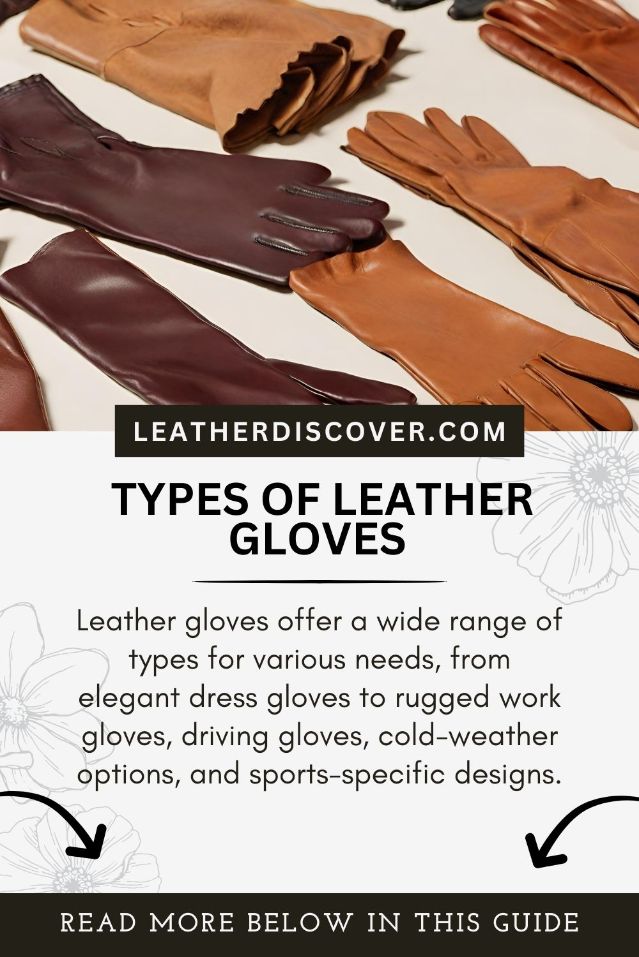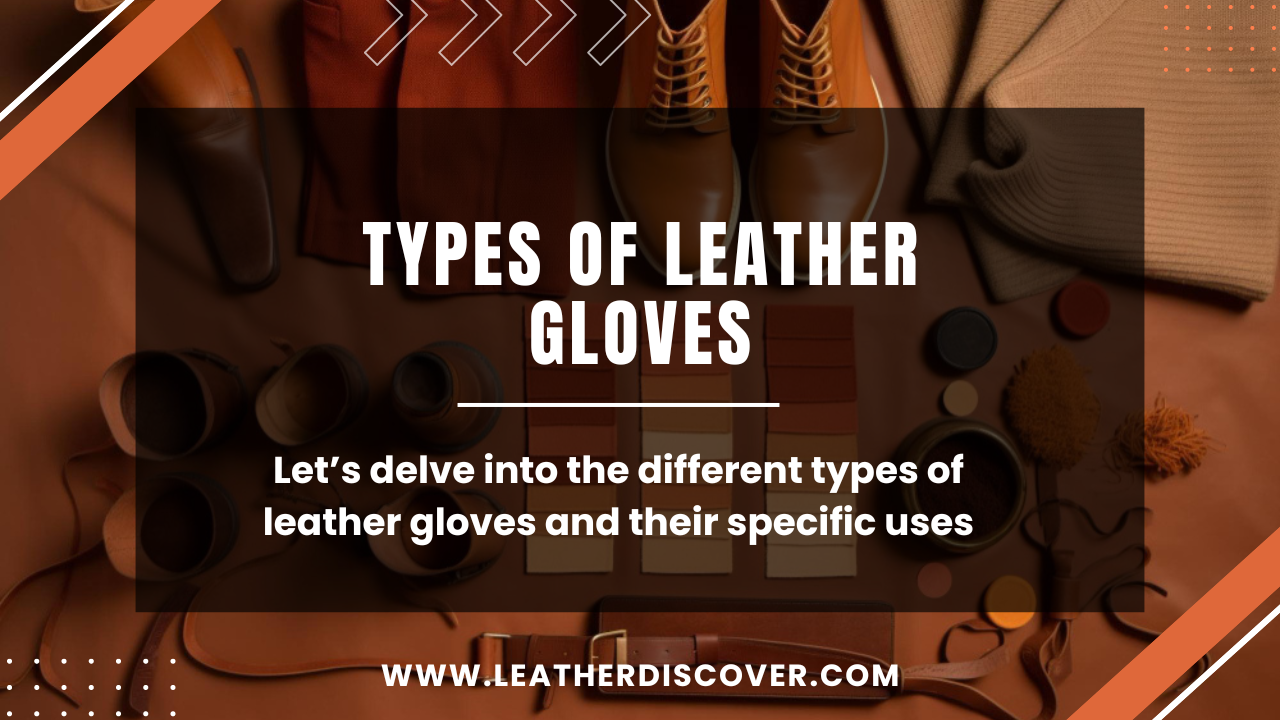Leather gloves have long been a symbol of craftsmanship, sophistication, and practicality. These versatile accessories come in a range of materials, each offering distinct qualities suited to various purposes.
From the rugged and durable cowhide gloves favored by workers in demanding industries to the luxuriously soft deerskin gloves worn by those seeking comfort and style, the world of leather gloves is diverse.
In this exploration, we’ll delve into the different types of leather gloves and their specific uses, shedding light on how these timeless accessories not only protect our hands but also make a statement in fashion and function.
[toc]

types of leather gloves and their uses
Here’s a table comparing different types of leather gloves based on their strength, softness, durability, and common uses:
| Leather Type | Strength | Softness | Durability | Common Uses |
|---|---|---|---|---|
| Full-Grain Cowhide | High | Moderate | Excellent | Work gloves, heavy-duty tasks |
| Deerskin | Moderate | High | Good | Driving gloves, dress gloves |
| Lambskin | Low | Very High | Fair | Fashion gloves, dress gloves |
| Pigskin | Moderate | Moderate | Good | Welding gloves, work gloves |
| Goatskin | Moderate | Moderate | Good | Tactile gloves, outdoor gloves |
| Exotic Leathers | Varies (e.g., alligator, crocodile) | Varies (e.g., alligator, crocodile) | Varies (e.g., alligator, crocodile) | Luxury fashion items |
Please note that the strength, softness, and durability of different types of leather gloves can vary depending on the specific tanning process and treatment, so these characteristics can be approximated.
Additionally, the common uses mentioned are not exhaustive and may vary based on individual preferences and specific glove designs.
Which Type of Leather Is Best for Gloves?
The choice of the “best” type of leather for gloves often depends on the specific needs and preferences of the user.
However, one leather type that is frequently considered among the best for gloves due to its combination of durability, flexibility, and comfort is Goatskin.
Goatskin gloves are highly regarded for several reasons:
- Dexterity: Goatskin leather is thinner and more pliable than some other leathers, allowing for excellent dexterity and tactile sensitivity. This makes it suitable for precision work and tasks where fine motor skills are required.
- Durability: Despite its softness, goatskin leather is quite durable and resistant to abrasions. It can withstand moderate wear and tear, making it suitable for various work environments.
- Comfort: Goatskin is known for its softness and comfort, which means that gloves made from this leather are often comfortable for extended wear.
- Grip: Goatskin provides a good grip, especially when treated with textured finishes or coatings. This is important for tasks that involve handling objects or tools.
- Resistance: Goatskin is naturally resistant to oil and water, which can be advantageous in certain work situations.
While goatskin is often considered an excellent choice for gloves, it’s important to remember that the “best” type of leather may vary depending on the specific task or personal preferences.
Types of Leather Gloves for Work:
Leather gloves come in various types for different work environments and tasks:
- General Work Gloves: Cowhide, pigskin, or goatskin gloves are commonly used for various general tasks, including construction, maintenance, and light industrial work.
- Welding Gloves: Cowhide or goatskin gloves are suitable for welding due to their heat resistance and durability.
- Gardening Gloves: Pigskin gloves are comfortable and absorb moisture, making them ideal for gardening and yard work.
- Heavy-Duty Gloves: Buffalo leather gloves are designed for heavy-duty and industrial applications, offering superior durability and protection.
- Precision Work Gloves: Goatskin or deerskin gloves are preferred for precision tasks that require dexterity and tactile sensitivity, such as mechanics or electronics assembly.
What Is the Strongest Leather?
The strength of leather can vary depending on several factors, including the type of animal hide, the tanning process, and the thickness of the leather.
Generally, full-grain leather is considered one of the strongest types of leather. Full-grain leather retains the outer layer of the hide, which contains the grain pattern and natural imperfections, making it more durable and robust.
Additionally, exotic leathers like alligator or crocodile can be exceptionally strong due to the unique texture and thickness of their hides.
What Is the Softest Leather?
The softness of leather is often associated with its suppleness and how it feels to the touch.
Lambskin leather is widely regarded as one of the softest types of leather due to its fine grain and lightweight nature. It’s often used for making luxurious clothing items like gloves and jackets.
Most Durable Leather Work Gloves
When it comes to work gloves, durability is essential because they need to withstand tough conditions and protect your hands.
Full-grain cowhide leather gloves are often considered the most durable for work purposes. They are tough, resistant to abrasion, and can handle heavy-duty tasks.
However, gloves designed for specific work environments or tasks may require different types of leather. For example, gloves for welding might use split cowhide or pigskin due to their heat resistance.
Deerskin vs. Cowhide Gloves:
Deerskin and cowhide are two popular choices for gloves, each with its own advantages:
1. Deerskin Gloves:
Deerskin gloves are known for their softness and flexibility. They are comfortable to wear and provide excellent dexterity. Deerskin is also naturally breathable, making it a good choice for gloves in various weather conditions.
However, deerskin may not be as durable as cowhide, so it may not be the best choice for extremely rugged work environments.
2. Cowhide Gloves:
Cowhide gloves are robust and durable, making them suitable for heavy-duty work. They can withstand abrasion, making them ideal for tasks that involve rough surfaces or handling heavy objects.
Cowhide gloves may take some time to break in but become more comfortable with use. They are less soft and supple compared to deerskin gloves but offer superior protection in demanding work settings.
The choice between deerskin and cowhide gloves depends on your specific needs. If you prioritize softness and dexterity, deerskin gloves may be preferable. If durability and protection are your main concerns, cowhide gloves are likely the better choice for heavy-duty work.
Conclusion:
So, now you know about different types of leather gloves, their strengths, uses and more!
The choice of leather for gloves depends on a variety of factors, including the intended use and personal preferences. Full-grain cowhide leather is often the top choice for work gloves due to its exceptional durability and resistance to abrasion.
Deerskin, on the other hand, offers unparalleled softness and flexibility, making it ideal for tasks that require dexterity and comfort. The strength of leather can vary, with full-grain and exotic leathers typically considered the strongest.
When selecting leather gloves, it’s crucial to balance factors such as durability, comfort, and the specific demands of the task at hand to ensure optimal performance and protection for your hands.
Ultimately, the right choice of leather glove will depend on your unique needs and preferences.
- What Is Caiman Leather? A Detailed Guide - July 25, 2024
- What Is Tumbled Leather?A Complete Guide - July 25, 2024
- What Is Kip Leather? Premium Leather Choice - July 24, 2024

